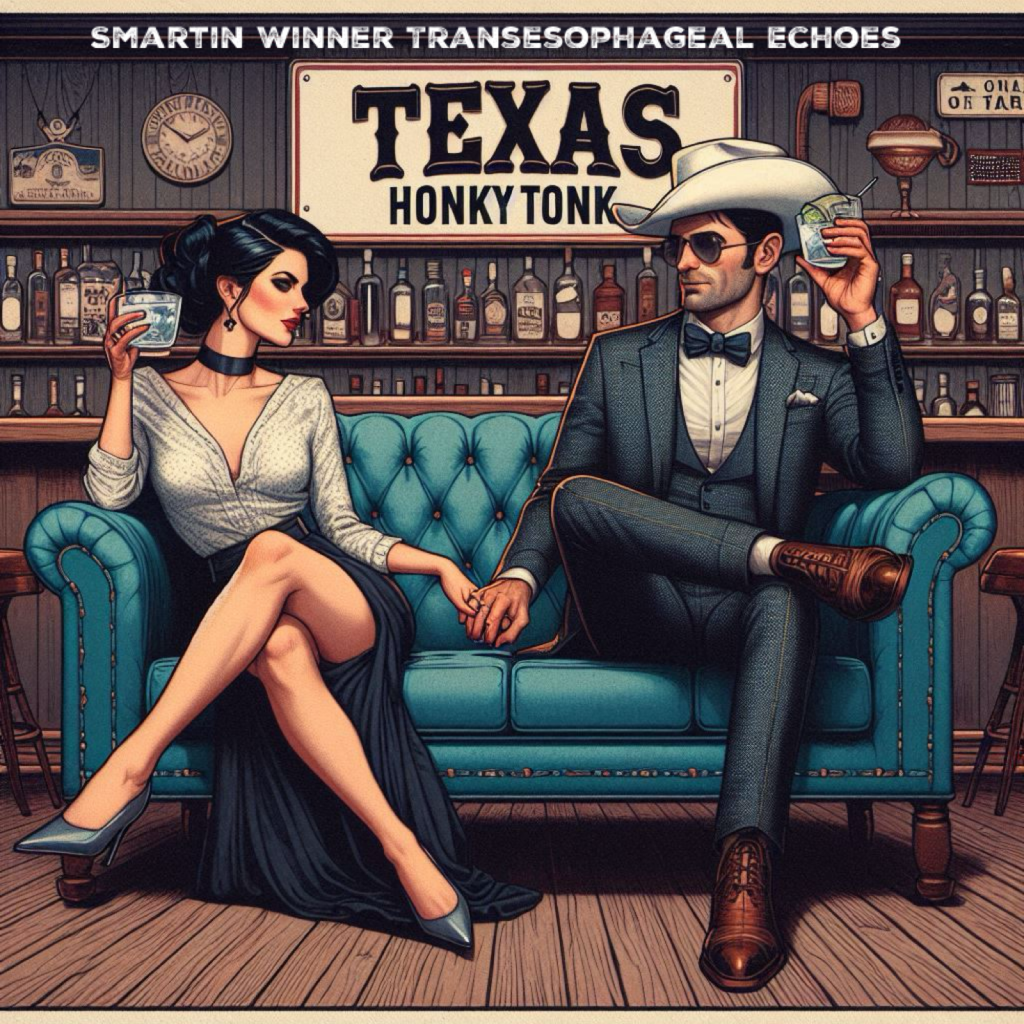
It is said that men always write their songs because of a woman or for a woman. I can say for this album that all these lyrics | poems were written within a few weeks, inspired by concerts and recordings of men: Mr Jones, Tobias Panwitz, Pat Carter, Herald K, Othmar Loschy, Seed Holden and Herr Dennehy.
Their vulnerability and frailty, anger and despair, their elegance and humor, love and concern, their aplomb and strength touched me deeply. Whatever window was open in me at the time.
As far as language and structure are concerned, I have to admit that I may have learned a great deal from Taylor Swift and Adrienne Lenker this summer, but of course they cannot be held responsible for any relapses into old white man boredom.

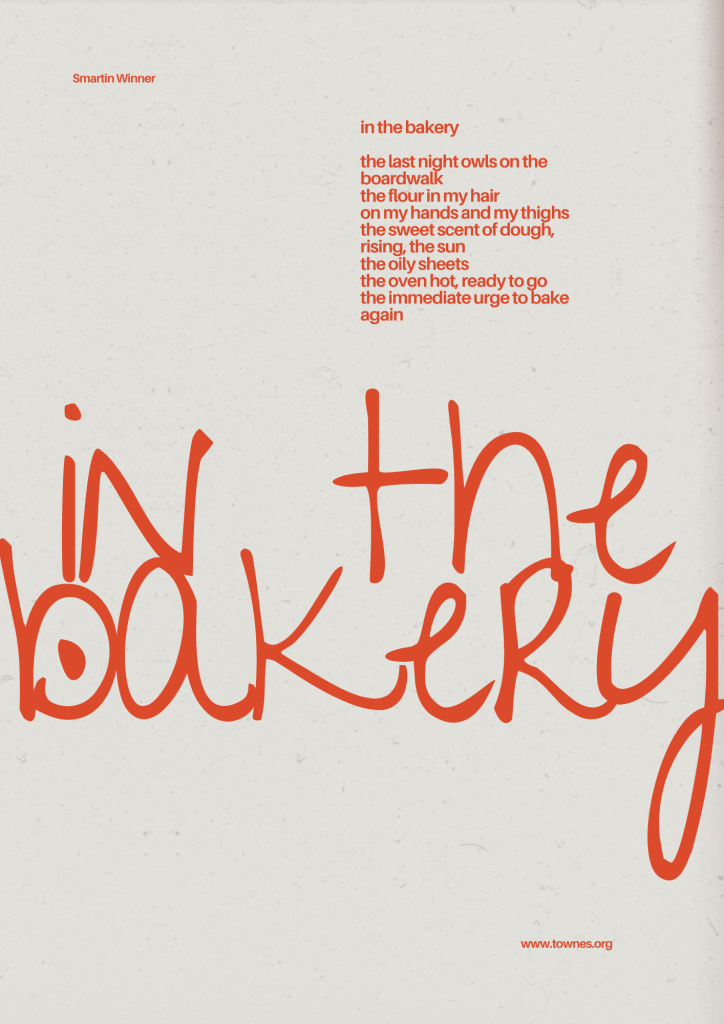



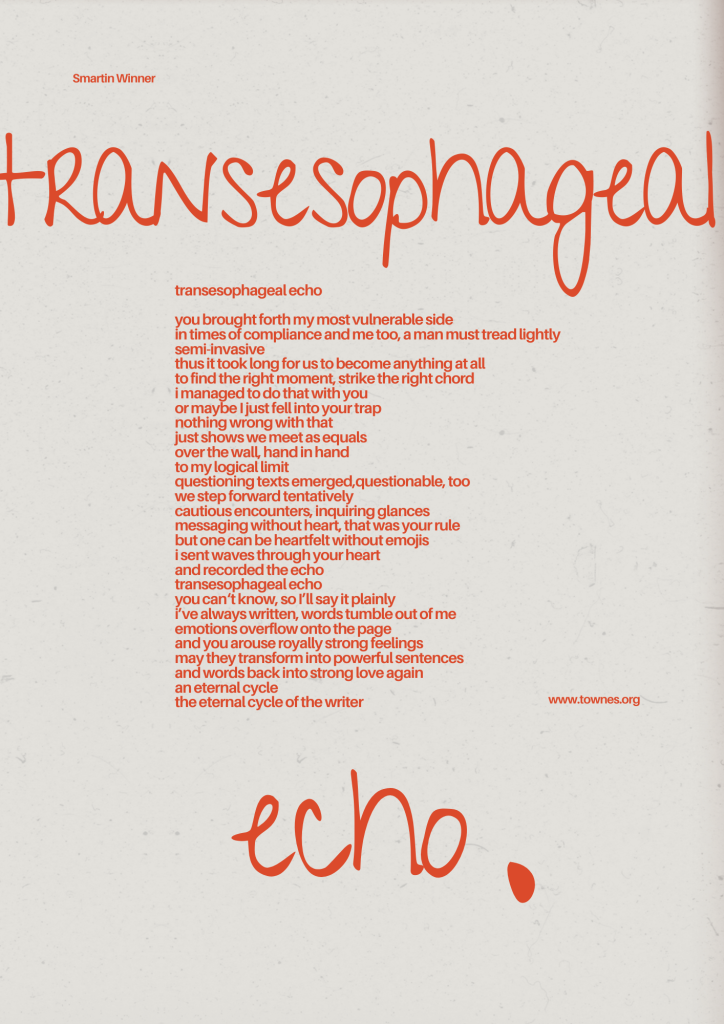
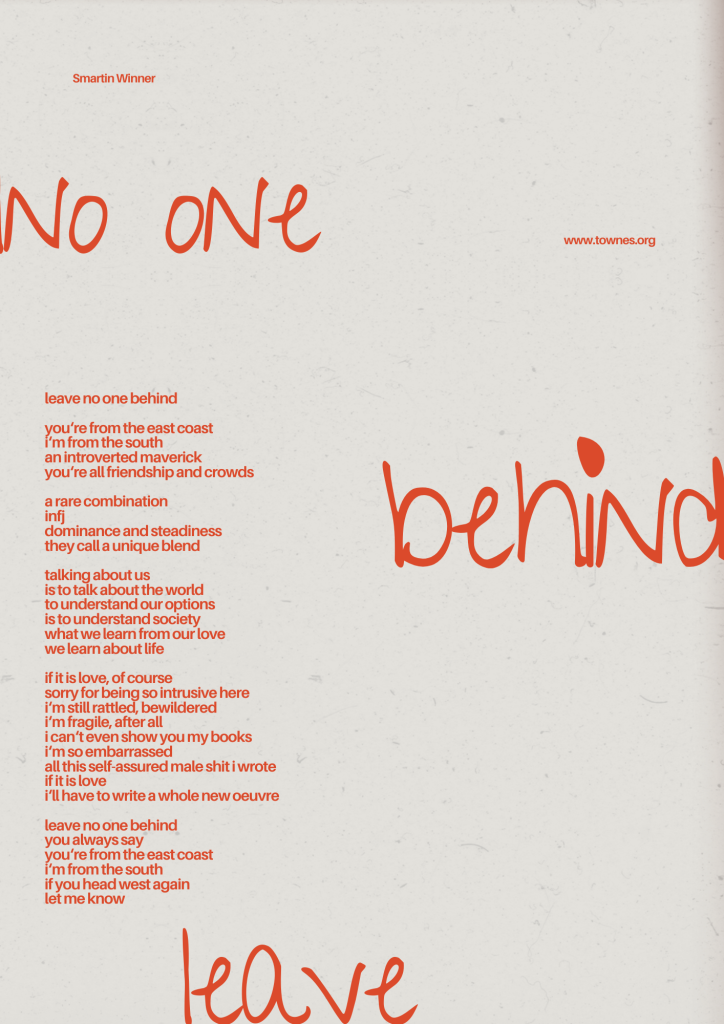


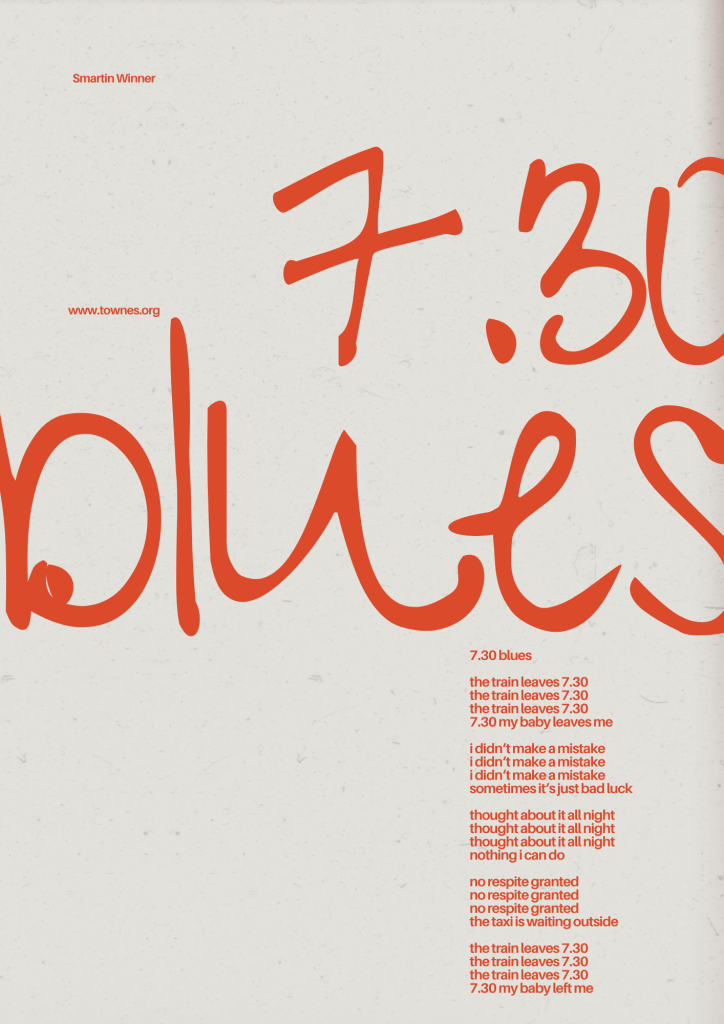


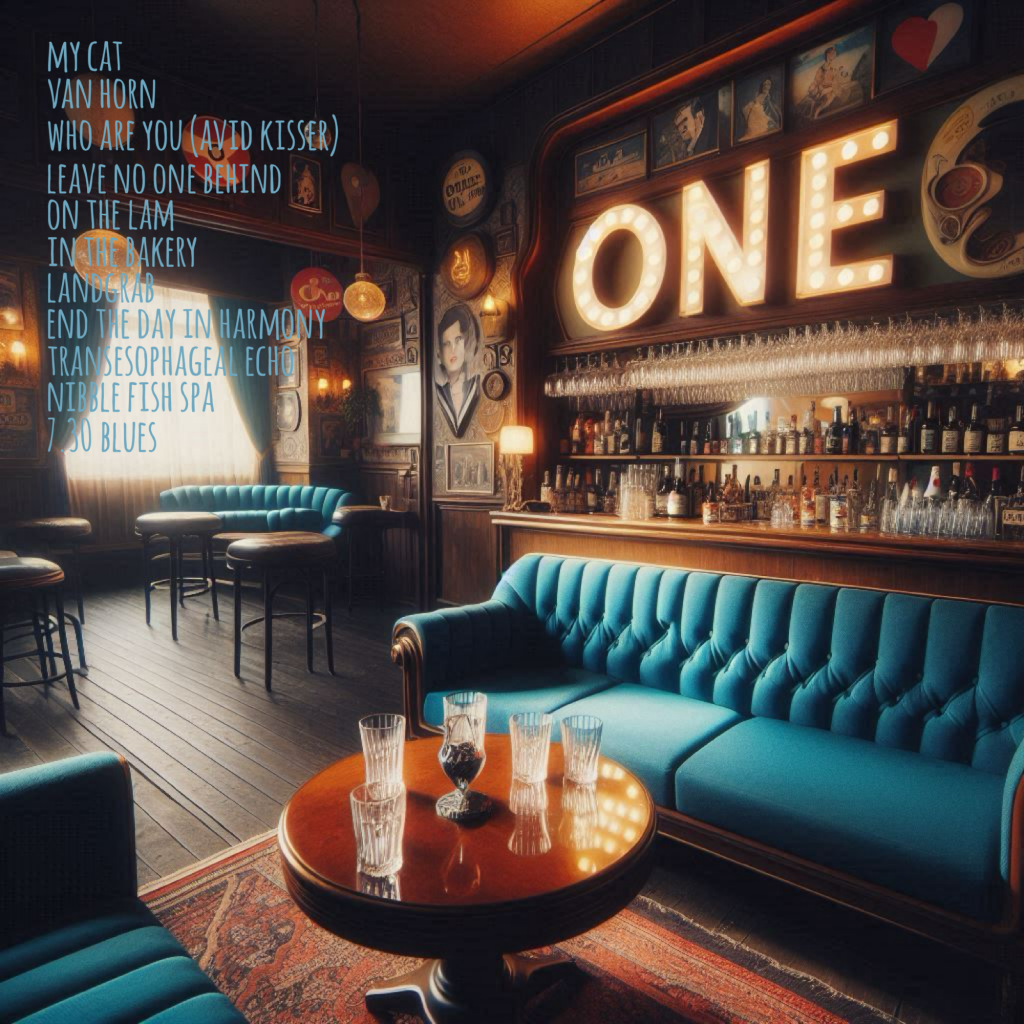
Here you will find a comprehensive introduction to the language and the content of this book, revealing many insights into the influences
In June 2024, Smartin Winner released “Transesophageal Echoes,” a collection of eleven evocative poems exploring themes of love, identity, and cultural barriers. The collection weaves references to German authors, Texas songwriters or British New Wave bands and the East-West divide to create a rich, multilayered tapestry.
Winner employs intimate and often sensual imagery to delve into personal relationships, using everyday settings and encounters to reflect deeper emotional and physical connections.
The collection draws heavily on German cultural and historical contexts. References to the Berlin Wall and the division between East and West Germany serve as powerful symbols of overcoming barriers, both personal and societal. This is particularly evident in the title poem, “transesophageal echo,” which alludes to Echo and the Bunnymen’s “Over the Wall” and themes from Jenny Erpenbeck’s work, emphasizing the struggle and triumph of bridging cultural divides.
Transesophageal Echoes: A Metaphor for Songs and Music
The title “Transesophageal Echoes” is multifaceted and deeply symbolic, resonating with the themes and motifs present throughout Smartin Winner’s poetry collection.
The title “Transesophageal Echoes” is a powerful metaphor for the profound and intricate nature of songs and music. At its core, it symbolizes the deep exploration and intimate resonance that music achieves, much like the medical procedure it references.
Exploring the Depths: In the medical world, a transesophageal echocardiogram (TEE) allows doctors to see the heart’s inner workings with unparalleled clarity by sending sound waves through the esophagus. This deeper examination surpasses the surface-level view provided by a standard echocardiogram. Similarly, songs and music delve into the depths of human emotion and experience. They penetrate beyond superficial feelings, exploring the core of our joys, sorrows, hopes, and fears. Music has the unique ability to touch the heart and soul, revealing the intricate layers of our inner lives.
Resonance and Reflection: The “echoes” in the title signify the reverberations of sound that linger and resonate. In music, echoes are not just physical sound reflections but also metaphorical reflections of thoughts, memories, and emotions. When we listen to music, it creates echoes within us, stirring up past experiences and connecting them to the present. This resonance is a key aspect of how music affects us, creating a lasting impact that continues to influence our feelings and thoughts long after the song has ended. Echoes signify sounds that bounce back, symbolizing the reverberation of past experiences, memories, and cultural influences that shape the present. This aligns with the poems’ exploration of historical and cultural contexts, such as the East-West German divide.
Clarity and Connection: Just as a TEE provides a clearer picture of the heart’s function, music provides clarity to our emotional and psychological states. It articulates what we often struggle to express with words alone. Songs have the power to connect us to our deepest selves and to each other, bridging gaps created by language, culture, and personal differences. They offer a universal language of emotion that fosters understanding and empathy among listeners.
Intimacy and Vulnerability: The transesophageal approach is invasive, suggesting a level of intimacy and vulnerability. Music, too, requires vulnerability from both the creator and the listener. Songwriters pour their hearts into their lyrics and melodies, exposing their innermost thoughts and feelings. In turn, listeners often find their own vulnerabilities reflected in the music, creating a bond of shared humanity.
“Transesophageal Echoes” can also be seen as a metaphor for sex, emphasizing deep connection and intimate resonance. Just as TEE provides a close view of the heart, sex involves physical and emotional closeness, revealing the innermost parts of ourselves. The echoes represent the lingering emotional and physical impacts of intimate encounters, which resonate long after the moment has passed. This metaphor highlights the profound connection and mutual vulnerability inherent in sexual relationships.
In conclusion, “Transesophageal Echoes” as a metaphor for songs and music beautifully captures the profound, resonant, and intimate nature of musical expression. It emphasizes how music delves deep into our emotional core, resonates with our experiences, and brings clarity and connection to our lives. Through this metaphor, we gain a greater appreciation for the transformative power of music, echoing within us long after the last note has faded.
Read more (What machines know! I wasn’t aware of most of that, but doesn’t that make it even more interesting?):
Note from the author:
Artificial Intelligence: Applied, not talked about. In my new album under the pseudonym Smartin Winner, a lot of things are supported by AI: vocabulary, translation, graphic realization, the cover. An AI-supported summary and interpretation also led to interesting results.
Nevertheless, my own creative contribution as an author remains high. Old love stories from Siemens, ratiopharm and DDB from the 00s as well as references to Texan songwriters are probably not much to find in the databases 🙂
In any case, this is a continuation of the approaches in my book “Hilmar/Townes“, about which it was said at the time: “A few years ago such a book would not have been possible. The composition, the language, the content and thus the reading experience are all determined by the Internet. At its core, the book is about the phenomenon of constructing an ego on the Internet: I am what I post. I am who my friends are, who I follow. I am what I share, like, and comment on – my books, my movies, my music, my stars. A life is made of clicks. From a distance, guided by his own personal filter bubble, the narrator emerges from a mosaic of surfing fragments. This is also reflected in the reception: you don’t read the book from cover to cover, you click into it, click further into the book and out of the book.“
Welcome to Transesophageal Echoes!
